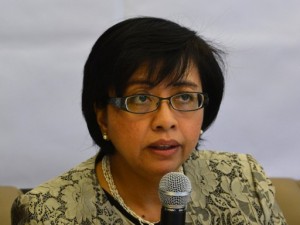Details of wealth sharing annex to Bangsamoro framework agreement bared
OZAMIZ CITY, Philippines — It took a record six days to negotiate and a grueling 12 hours of session on the last day before the peace panels of the Philippine government and the Moro Islamic Liberation Front (MILF) hammered out a consensus on the Annex on Revenue Generation and Wealth-Sharing.
Among others, the eight-page annex has sections on taxation, other sources of revenue, fees and charges, grants and donations, fund transfers from Central Government, contracting of loans and overseas development assistance, natural resources, and additional fiscal powers, according to a news release of the Office of the Presidential Adviser on the Peace Process (OPAPP).
The Annex, said government chief negotiator Miriam Coronel-Ferrer, would fulfill the aspirations for meaningful autonomy for Muslim Mindanao that was envisioned in the Constitution.”
“It will correct the flaws in the current fiscal system in the ARMM (Autonomous Region in Muslim Mindanao),” Coronel-Ferrer added.
Earlier, MILF chief negotiator Mohagher Iqbal told the Philippine Daily Inquirer they gave the negotiations for the Annex particular attention “because the resources under the disposal of the future Bangsamoro will give real meaning to its political autonomy.”
“Fiscal autonomy goes hand in hand with political autonomy,” he stressed.
A preliminary consensus was reached among the parties last February. But government decided to have this subjected to due diligence review so that “it pass the test of implementation.” By June, government has proposed refinements to the preliminary document.
According to Coronel-Ferrer, the government panel sought the insights of technical experts, Cabinet secretaries and several legislators in the process of firming up a refined proposal. It took some three months before government negotiators expressed readiness to have its new position discussed by MILF counterparts.
The OPAPP news release said the annex recognized that “wealth creation (or revenue creation and sourcing) is important for the operation of the Bangsamoro, considering that the Bangsamoro territory is among the most underdeveloped in the Philippines due to the decades-old conflict.”
It also acknowledged the problem that the current ARMM, which will largely comprise the future Bangsamoro, has a “very limited” tax base.
Amid such backdrop, the annex grants preferential treatment to the Bangsamoro vis-a-vis the central government in the sharing of existing revenues and future wealth creation activities.
For one, 75 percent of “Central Government taxes, fees and charges collected in the Bangsamoro, other than tariff and custom duties” will go to the Bangsamoro Government, including the shares of the component local governments. The rest goes to the central government.
Government income “derived from the operations of Bangsamoro government-owned and controlled corporations (GOCCs), financial institutions, economic zones, and freeports” operating in the region, goes to the coffers of the Bangsamoro Government.
The Bangsamoro government “shall have authority and control” over existing GOCCs and financial institutions operating exclusively in its territory, “after determination by the intergovernmental fiscal policy board of its feasibility.”
The central government shall also provide for a Special Development Fund to defray the costs of rehabilitation and development that shall commence upon the ratification of the Bangsamoro Basic Law.
For income derived from exploration, development and utilization of metallic minerals within the region, 75 percent shall accrue to the coffers of the Bangsamoro government. For non-metallic minerals such as sand, gravel and quarry resources, the revenues will wholly go to the Bangsamoro government and its component local governments.
For income derived from exploiting energy resources like uranium, and deposits of fossil fuels like petroleum, natural gas and coal, the Bangsamoro and central governments will share equally.
Iqbal has said that at the minimum, the MILF’s position is for the future Bangsamoro “to get more than what the ARMM currently gets.”
“We have already agreed that the status quo is unacceptable. That applies to all the issues, whether power-sharing or wealth-sharing,” he pointed out.
Based on Republic Act No. 9054, the amended Organic Act of the ARMM, the regional government gets 35 percent of “the collections of a province or city from national internal revenue taxes, fees and charges, and taxes imposed on natural resources…”
The other 35 percent goes to the province or city, and the remaining 30 percent goes to the national government.
RA 9054 also provides that 50 percent of the national government’s share in “yearly incremental revenue” from value-added tax collections shall be shared by the Regional Government and its component local governments, with the latter getting 80 percent.
The present ARMM charter classifies uranium, fossil fuels and the like as strategic minerals for which the regional government has no jurisdiction over. It also has no jurisdiction over “all sources of potential energy; lakes, rivers, and lagoons; and national reserves and marine parks, as well as forest and watershed reservations.”
In the event strategic minerals are used, RA 9054 provides that 50 percent of income goes to the regional government and its component local governments, “until laws are enacted that provide otherwise.”
